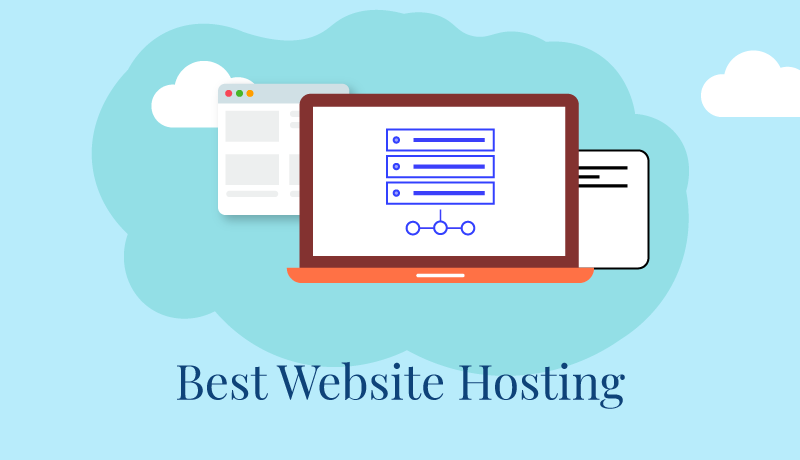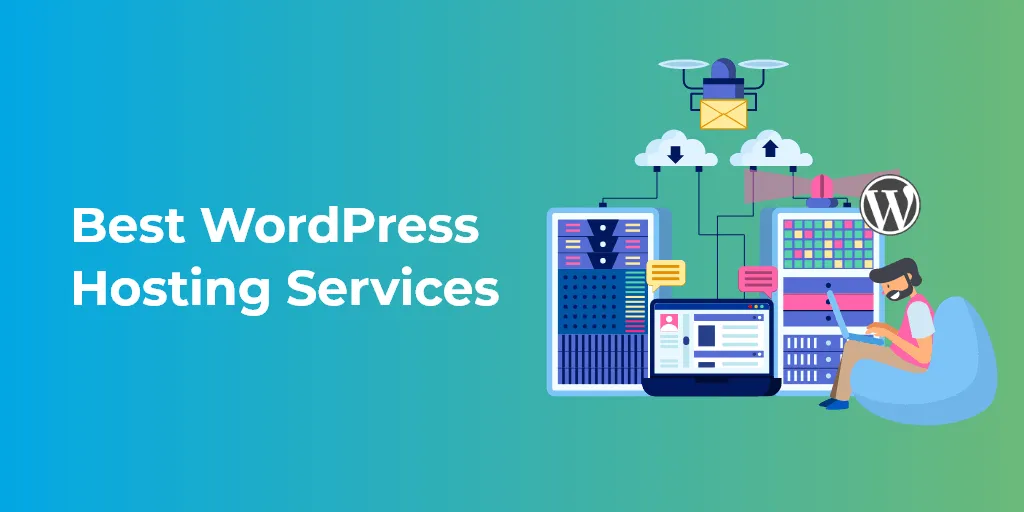Choosing the right hosting service for your WordPress website might feel overwhelming, especially with so many options out there. But don’t worry! In simple terms, WordPress hosting is a service specifically optimized for running
Factors to Consider When Selecting a WordPress Hosting Service

Finding the perfect hosting service isn’t just about price; it’s about matching features to your website’s needs. Here are some key factors to keep in mind:
- Performance & Speed: Your visitors won’t wait around! Look for hosts that offer fast load times with solid hardware, caching, and CDN options.
- Uptime Reliability: You want your site to be available 24/7. Aim for hosts with 99.9% uptime guarantees to minimize downtime.
- Security Features: WordPress sites can be targets for hackers. Choose hosts that include firewalls, malware scanning, SSL certificates, and regular backups.
- Customer Support: Sometimes, you’ll need help fast. Opt for hosts with responsive, knowledgeable support available via multiple channels like chat, email, or phone.
- Ease of Use & Management: A user-friendly control panel and one-click WordPress installs can save you a lot of headaches, especially if you’re new to web hosting.
- Scalability: As your website grows, your hosting needs might change. Look for providers that offer easy upgrades without hassle.
- Pricing & Value: Balance affordability with features. Sometimes paying a bit more upfront can save you headaches and money later.
Beyond these factors, it’s also helpful to read reviews, check for money-back guarantees, and see what kind of support community or resources are available. Taking the time to evaluate these aspects will help ensure you pick a hosting service that supports your website’s growth and success.
3. Top Features to Look for in a WordPress Hosting Provider

Choosing the right hosting provider for your WordPress website can feel a bit overwhelming, especially with so many options out there. But don’t worry—focusing on a few key features can make your decision much easier. Here’s what you should keep an eye on:
- Performance and Speed: Your website’s speed is crucial—not just for user experience but also for SEO. Look for hosts that offer SSD storage, CDN integration, and optimized server environments for WordPress. Fast-loading sites keep visitors happy and improve your Google rankings.
- Uptime Guarantee: No one wants their website to be down when visitors are trying to access it. Aim for a provider that offers at least 99.9% uptime. This ensures your site stays accessible around the clock.
- Security Features: WordPress sites are common targets for hackers. The best hosts will include security tools like malware scanning, firewalls, automatic backups, and SSL certificates—so your site stays safe without extra hassle.
- Ease of Use and Management: If you’re not a tech wizard, look for a host with a user-friendly control panel—cPanel, Plesk, or custom dashboards—that makes managing backups, updates, and domains straightforward.
- Customer Support: When things go wrong (and they sometimes do), having responsive, knowledgeable support can be a lifesaver. Look for providers that offer 24/7 support via live chat, phone, or ticket system.
- Scalability: As your website grows, your hosting needs might change. Choose a provider that offers easy options to upgrade your plan—more resources, better performance, or additional features—without hassle.
- Price and Value: While it’s tempting to go for the cheapest option, remember that quality hosting is an investment. Look for a balance of affordability and features that match your site’s needs.
In a nutshell, the best WordPress hosting provider should combine speed, security, reliability, and ease of management—all at a fair price. Taking the time to evaluate these features can save you headaches down the road and ensure your website runs smoothly as you grow.
4. Comparison of Popular WordPress Hosting Services
Now that you know what features to look for, let’s compare some of the most popular WordPress hosting providers out there. Here’s a quick rundown of their strengths and what makes each one stand out:
| Hosting Service | Best For | Pricing (Starting at) | Key Features |
|---|---|---|---|
| Bluehost | Beginners & Small Websites | $2.95/month |
|
| SiteGround | Performance & Support Seekers | $3.99/month |
|
| WP Engine | High-Traffic & Business Sites | $20/month |
|
| HostGator | Budget-Friendly & Easy Setup | $2.75/month |
|
| Kinsta | Premium Performance & Support | $35/month |
|
Each of these providers has its own strengths depending on your specific needs. For example, Bluehost and HostGator are excellent choices if you’re just starting out and want affordability. SiteGround offers solid support and performance, making it a favorite among many bloggers. WP Engine and Kinsta cater to more advanced users or high-traffic sites that require top-tier performance and managed services.
When choosing, consider your budget, expected traffic, technical skills, and whether you prefer managed hosting (where most technical tasks are handled for you) or self-managed options. Remember, investing in good hosting can significantly impact your website’s success, so it’s worth taking the time to pick the right one.
5. Benefits of Using Specialized WordPress Hosting
When it comes to hosting your WordPress website, choosing a specialized WordPress hosting service can make a world of difference. It’s not just about having a server that can run
One of the biggest advantages is performance. Specialized WordPress hosts often come with built-in caching, server configurations tailored for WordPress, and optimized PHP settings. This means your site loads faster, which is a big deal for visitor experience and SEO rankings.
Security is another key benefit. WordPress is a popular platform, which unfortunately also makes it a target for hackers. Hosting providers that focus on WordPress usually offer enhanced security features like automatic updates, malware scanning, and firewalls specifically designed to protect WordPress sites from common vulnerabilities.
Plus, management becomes a breeze. Many specialized hosts provide one-click staging environments, automatic backups, and easy WordPress installations. These tools save you time and help you manage your site more confidently, even if you’re not a tech wizard.
Customer support tailored for WordPress issues is another perk. When you run into problems, having experts who understand WordPress inside out can make troubleshooting much faster and less stressful. Instead of generic support, you get guidance specific to your platform.
In short, using a specialized WordPress hosting service can lead to a more secure, faster, and hassle-free website experience. If you’re serious about your site—whether it’s a blog, an online store, or a portfolio—investing in WordPress-specific hosting is a smart move that pays off in the long run.
6. Tips for Optimizing Your WordPress Website Hosting
Once you’ve chosen a hosting provider, the next step is making sure your WordPress site is optimized for the best performance. Here are some practical tips to help you get the most out of your hosting environment:
- Keep everything updated: Regularly update WordPress core, themes, and plugins. Hosting providers often offer automatic updates, so enable them if possible. Outdated software can slow down your site and pose security risks.
- Use caching effectively: Implement caching plugins like WP Super Cache or W3 Total Cache. Many specialized hosts include built-in caching, so make sure it’s enabled to speed up page loads.
- Optimize images: Large images can significantly slow down your site. Use image optimization tools or plugins like Smush or ShortPixel to compress images without losing quality.
- Choose a good hosting plan: If your site grows, consider upgrading your plan. Shared hosting is fine for small sites, but larger or traffic-heavy sites benefit from VPS, dedicated, or managed WordPress hosting.
- Enable CDN (Content Delivery Network): A CDN distributes your website content across multiple servers worldwide, reducing latency. Many hosting providers integrate CDN options directly into their dashboards.
- Minimize plugins: Too many plugins can bog down your site. Keep only essential plugins, and regularly review and delete unused ones to keep your site lean.
- Optimize your database: Over time, your WordPress database can become cluttered. Use plugins like WP-Optimize to clean up revisions, spam comments, and transient options.
- Monitor your site’s performance: Use tools like Google PageSpeed Insights or GTmetrix to identify bottlenecks and get actionable suggestions for improvement.
Remember, hosting optimization isn’t a one-time task. Regular maintenance, updates, and monitoring keep your site running efficiently and ensure your visitors have a smooth experience every time they visit.
Conclusion and Recommendations for the Best WordPress Hosting Service
Choosing the right hosting service is crucial for the success of your WordPress website. A reliable host ensures your site loads quickly, remains secure, and offers excellent uptime, which are all vital for user experience and SEO. Based on the key factors discussed, such as performance, security features, customer support, and pricing, we can narrow down some top recommendations.
For beginners or small websites: Bluehost is highly recommended due to its user-friendly interface, one-click WordPress installation, and affordable plans. It also offers excellent customer support, making it a solid choice for those just starting out.
For high-traffic or large websites: SiteGround provides superior performance, strong security features, and exceptional support. Its managed WordPress hosting plans are optimized for speed and scalability, making it suitable for growing sites.
For developers or those seeking flexibility: WP Engine specializes in managed WordPress hosting with advanced features, automatic backups, and staging environments. While it is more expensive, it offers unmatched reliability and performance.
| Hosting Provider | Best For | Key Features |
|---|---|---|
| Bluehost | Beginners & Small Sites | Easy setup, affordable plans, good support |
| SiteGround | Growing & High-Traffic Sites | Speed optimization, security, excellent support |
| WP Engine | Developers & Large-scale Sites | Managed hosting, staging, automatic backups |
In conclusion, the best WordPress hosting service depends on your specific needs, budget, and technical expertise. Carefully consider the features that matter most to your website’s success and choose a provider that offers reliable support and scalability for future growth.


